Son and Ranchhod had 9 children – those that survived. The eldest grandchild was older than their own youngest baby! This was a common story of many a family! By the time I grew up to understand family relationships, and recognise uncles and aunts (I will use the romanised gujarati words for these relationships! English is rather limited for such purposes!) Kaka;s and foi’s – many of the foi’s had passed away, and only the eldest foi and eldest of Ranchhod’s progeny was around – Hiralaxmi. Of the kaka’s, all were around during my teens: Natwar the eldest son, Tribhuvan the freedom fighter, and Indu the youngest and swift of feet! Papa’s sisters were Kundan, Savita, Lalita and Kanchan. All gone before I came arou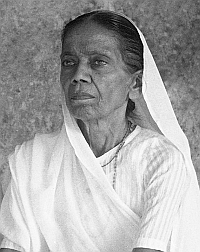 nd. No wonder papa’s second favourite poem was Wordsworth’s We Are Seven”. Papa as the “mama” had many nephews and nieces – Bhaani and Bhaniya - but I knew only a few well: Lata who lived us between high school and marriage is as close to a sibling as possible, Manjeri who was a neighbour, and Jaikishori who was papa’s mentoree! I did come to know allmost the rest when they visited Bombay from Surat, Vadodara and Amdavad – their hometowns, since sulumami and our house was home away from home. Papa as Kaka had equally large number of N&N – bhatriji and Bhatrija – and I was closest in age and bond to Indukaka’s children: Yogesh and Rupa. Many a pranks and adventures at their place in Amdavad. Foiba – Hiralaxmi – was 20 years older than papa, a teenage widow back to her father’s house looked after all her siblings, especially after Sonbaa passed away early – 23 years before Ranchhod – papa’s bond with her was like a mother. I had heard that Sonbaa had a dietary restriction of saltless food (which I guess was a hypertension solution), which she found difficult to observe. So baapaji – as papa’s father was called – said,”I too will observe that dietary limitation to give you company!”. She broke in a couple of weeks, baapaji continued for the rest of his days 23 years on! Motaakaka (Natwar) was a Sanskrit scholar, and teaching Sanskrit in a school. He lived in a house in one of Amdavad’s inner city area which was traditionally a warren of narrow lanes called a “pol”, laid out a few hundred years inside the city’s fortifications. Only horse drawn carriage or a modern two wheeler could go through these lanes. Tribhukaka had a chequered career. Did not study past high school, got active in the fight for
nd. No wonder papa’s second favourite poem was Wordsworth’s We Are Seven”. Papa as the “mama” had many nephews and nieces – Bhaani and Bhaniya - but I knew only a few well: Lata who lived us between high school and marriage is as close to a sibling as possible, Manjeri who was a neighbour, and Jaikishori who was papa’s mentoree! I did come to know allmost the rest when they visited Bombay from Surat, Vadodara and Amdavad – their hometowns, since sulumami and our house was home away from home. Papa as Kaka had equally large number of N&N – bhatriji and Bhatrija – and I was closest in age and bond to Indukaka’s children: Yogesh and Rupa. Many a pranks and adventures at their place in Amdavad. Foiba – Hiralaxmi – was 20 years older than papa, a teenage widow back to her father’s house looked after all her siblings, especially after Sonbaa passed away early – 23 years before Ranchhod – papa’s bond with her was like a mother. I had heard that Sonbaa had a dietary restriction of saltless food (which I guess was a hypertension solution), which she found difficult to observe. So baapaji – as papa’s father was called – said,”I too will observe that dietary limitation to give you company!”. She broke in a couple of weeks, baapaji continued for the rest of his days 23 years on! Motaakaka (Natwar) was a Sanskrit scholar, and teaching Sanskrit in a school. He lived in a house in one of Amdavad’s inner city area which was traditionally a warren of narrow lanes called a “pol”, laid out a few hundred years inside the city’s fortifications. Only horse drawn carriage or a modern two wheeler could go through these lanes. Tribhukaka had a chequered career. Did not study past high school, got active in the fight for 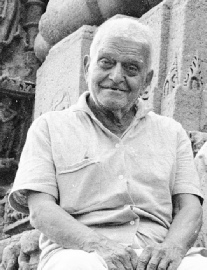 independence, and was last known to be a journalist in that domain. Subsequently he tried his hand at various jobs. He lived with us for a few years when I was young, and he spoilt me silly. He was a bit of a handyman, repairing things, or making new boxes and stuff. Another colourful kaka was Indukaka. He was in the British-Indian army during WW-II, but separation form that was cloudy. My recollections of life as a toddler includes his family living with us, and that is how Yogesh and Rupa were my best buddies.
independence, and was last known to be a journalist in that domain. Subsequently he tried his hand at various jobs. He lived with us for a few years when I was young, and he spoilt me silly. He was a bit of a handyman, repairing things, or making new boxes and stuff. Another colourful kaka was Indukaka. He was in the British-Indian army during WW-II, but separation form that was cloudy. My recollections of life as a toddler includes his family living with us, and that is how Yogesh and Rupa were my best buddies. 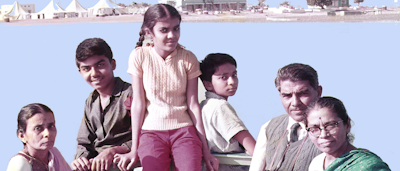 Indukaka had many adventures, and knew many “funny” characters. Cricket was his passion, which came true after he moved to Amdavad. And papa? This website is about him anyway, right?
Indukaka had many adventures, and knew many “funny” characters. Cricket was his passion, which came true after he moved to Amdavad. And papa? This website is about him anyway, right?
Stable as papa was in life, mummy was the port of call for many a bhaniya bhatrija’s. Mami would solve all problems. We lived in a rather old but parge apartment roughly late 40’s onwards. Papa once told me that 17 brides or grooms set off for their weddings from that house on Wilson Street! Nephews, nieces, friends and extended family included!
Our next house was tiny, but walking distance from the train terminus that served western India. Various cousins (my cousins) would turn up at our house early morning, straight from the night train from Amdavad or Vadodara or Surat! Wash up, have lunch – which mummy would scale accordingly – go out for their business, come back in the evening, have dinner, and take off for the station on their way home! Anju maintained this hosting tradition well after mummy passed away, but by then, the number of cousins who travelled had started going down, and Sulumami’s absence contributed to my contact with my cousins reducing as well.
We are of “Dasha Porvad” caste, but of the Jambusar branch – which would be papa’s and the larger “Shah” family’s home town. The Mumbai-Surat branch is a separate entity (of which mummy was a part!). This is a common story all castes. One clarification: the English word “caste” is a major disinformation due to it’s association with social stresses. The word used in Gujarati is “Gnyat”. It basically indicates identity and grouping for organising the social activities and traditions. While there is no denying the abuse of these structures, there is great merit in it’s main operational aspect.
I had never been to Jambusar, and when an occasion came up after Anju and I got married, mummy sent us off to attend. The experience was great. We were immediately integrated into the household of the girl getting married, and joined into various wedding preparations straight away. The ceremony was at the Gnyat’s wadi – community premises – where the extended family pitched into all tasks, be it cooking, serving guests at lunch, chopping veggies, or just yakking away into the wee hours!
I am closest to Latuben.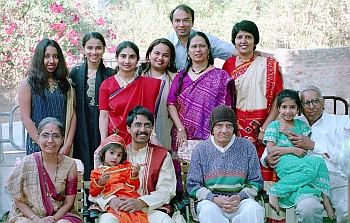 Foiba and Latuben joined us after foiba retired from Vanita Vishram – a residential girls school in Bombay. Latuben is about 10 years older, and we grew up together till she got married.
Foiba and Latuben joined us after foiba retired from Vanita Vishram – a residential girls school in Bombay. Latuben is about 10 years older, and we grew up together till she got married.
We had gone on a hike to Avandh-Patta, twin forts of Shivaji, about 100 miles from Bombay in the Saihyadri’s. Ashvinbhai, Tiluben (his better half) the three of us, and a few others to make two car loads. I was in mid-teens then, I think. I got talking to Tiluben, and the topic turned to attributes of the girl that I would like to make my life partner. Tiluben had a knack of ferretting out all my thoughts on the subject: Not personal ones ofcourse, because those were just imagination at that stage in life! I had come home after completing my graduation from IIT-Bombay, and landed a job as well. Mummy had kicked off her search for a suitable girl. But before asking me about it, papa set her a condition. You want to get Hemant married? But I will want them to stay separately from us! Mummy was in tears! But WHY? She asked. Because, once your daughter-in-law joins our family, you will be deposed as the “boss”! Mummy was breathless, no no, I will make her the queen of the house, But we will stay together! Actually, papa wanted her to say exactly that – the expression of abdication of the throne! Mummy missed having a daughter, and was never into the daughter-in-law thing. She would welcome a daughter to our family.
So, except for informing the town crier, mummy set all processes on, “my son is ready!”. Ashvinbhai-Tiluben suggested, “she is a bit cuckoo like you guys about nature and wandering. She will fit into your family very well”. They had spoken to Prafullbhai too.
Prafullbhai knew papa and me, since we had been giving our photo film rolls to him for development and enlargement for quite a few years. Boy meet girl was arranged at Prafullbhai’s studio. I had given a job interview with the Tata’s that afternoon, and reached 40 minutes late. Prafullbhai says, “this is Anju, and this is Hemant! Now bothof you get out, go where you want, chat, talk whatever”. Bombay is a thin tapering strip of land – actually a few islands joined together. Kolaba is the southernmost one, and taken over by the navy as a cantonment of sorts, accessible at all times by civilians. Nice tree shaded roads, little traffic, calm peaceful atmosphere. We walked along and talked. Within less than a week, we both knew our hearts, but even before that mummy had ensconced Anju in her heart. She did not say anything, but her palpitations settled after we confirmed! We got married before I started my job with Telco (now Tata Motors) or Anju completed her diploma in Special Education. Immediately on 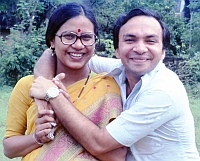 returning from our honeymoon, mummy handed the cupboard keys to Anju, who reacted as if her hands got singed! No, I don’t want the keys, you keep them! All this was symbolic, because the keys were always lying in the little pull out drawer of the sewing machine, and it had no lock! Mummy got her daughter and I got two bosses! Anju became a devoted disciple of mummy’s, and the Shah family started a new chapter.
returning from our honeymoon, mummy handed the cupboard keys to Anju, who reacted as if her hands got singed! No, I don’t want the keys, you keep them! All this was symbolic, because the keys were always lying in the little pull out drawer of the sewing machine, and it had no lock! Mummy got her daughter and I got two bosses! Anju became a devoted disciple of mummy’s, and the Shah family started a new chapter.
Now we come to the Shah family that Anju and I started – our girls! Janaki and Vaidehi. Anju had delivered Janaki that morning – a little past midnight. Mummy came to the hospital with all the post delivery supplements, and I reached there from home. The zodiac sign was Makar, (Capricorn) and letters recommended for names were kh and J. kh was a difficult consonant to find names beginning with, and the name Janaki had popped into my head. I went into Anju’s hospital room and said “I have thought of a name!”, and mummy chimed in with “I have also thought of one”, and Anju echoed the same words. You first, you first, and all three said “Janaki”!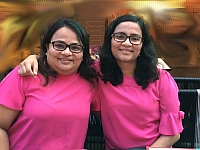 and that was it! Simply as a discussion, we asked one another that suppose Janaki had not been unanimous, what would be the backup name, and all three said Vaidehi! 5 years later, same hospital, same gynaecologist, same post delivery room, our second daughter became Vaidehi, even though mummy was no longer with us. The zodic was Meen (Pisces) and the letters were d(soft), ch z or th. Nothing worked, so Vaidehi our backup name for daughters was IT! It was a bit autonomic that our family would like names from Ramayan, because mummy was born on Ramnavami – Ram’s birthday – and all associations with Ram persisted in our family - they still do. All of us had repeatedly listened to a composition – a story song – about Sita, composed and sung by Ninu Mazumdar and team called “Geet Sitayan” and we all simply loved it. It is Ramayan story with Sita as the lead. Thus it came to pass, that Sita came to our family, and what do you know… this Vaidehi fell into the arms of RamKumar 20+ years later! Ravi arrived in 2021, and has dominated our lives since! Janaki has become a scientist, and Vaid
and that was it! Simply as a discussion, we asked one another that suppose Janaki had not been unanimous, what would be the backup name, and all three said Vaidehi! 5 years later, same hospital, same gynaecologist, same post delivery room, our second daughter became Vaidehi, even though mummy was no longer with us. The zodic was Meen (Pisces) and the letters were d(soft), ch z or th. Nothing worked, so Vaidehi our backup name for daughters was IT! It was a bit autonomic that our family would like names from Ramayan, because mummy was born on Ramnavami – Ram’s birthday – and all associations with Ram persisted in our family - they still do. All of us had repeatedly listened to a composition – a story song – about Sita, composed and sung by Ninu Mazumdar and team called “Geet Sitayan” and we all simply loved it. It is Ramayan story with Sita as the lead. Thus it came to pass, that Sita came to our family, and what do you know… this Vaidehi fell into the arms of RamKumar 20+ years later! Ravi arrived in 2021, and has dominated our lives since! Janaki has become a scientist, and Vaid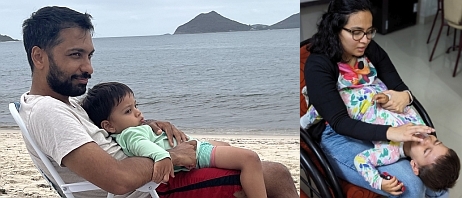 ehi a journalist and wordsmith. One of Janaki’s favourite game as a toddler wsa to make the adults sit down in her “class” and she would teach! And that is exactly what she has been doing professionally. A senior lecturer at a polytechnic in Singapore, a PhD in hand, teaching genetics. Vaidehi is a words warrior defending ecology and nature.
ehi a journalist and wordsmith. One of Janaki’s favourite game as a toddler wsa to make the adults sit down in her “class” and she would teach! And that is exactly what she has been doing professionally. A senior lecturer at a polytechnic in Singapore, a PhD in hand, teaching genetics. Vaidehi is a words warrior defending ecology and nature.
Our Chosen Family, 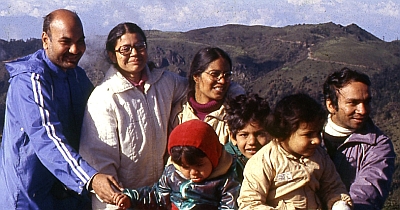 is people we choose to be friends with become as close as biological families. Ours is Dhananjay and family. I completed secondary school, and eagerly reached college. Roll numbers in college are alphabetic on family names, and since Dhananjay is also a “Shah” our roll numbers were close, and we ended up in the same division of First Year Science: FYSc! We had about 30 girls in a class of 150, and all were keen on showing off in front of the girls. The seating system was that the first two rows of the benches (auditorium style class layout) were reserved for the girls. We had to charge up the stairs after the gates opened, to grab the row just behind the girls – row 3. It so happened that 6 of us who squeezed on to that central bench on row 3 the first day, stayed together through out the year. If one guy made it to that bench, he would keep places for the other 5. Four of us from St Xavier’s school (my school) and two from a Gujarati medium school named Fellowship. Dhaniyo and Bhuriyo. (Bhuriyo because he had blue eyes – given name is lost in time, but was probably Narendra). We quickly became a team for any prank or mischief that year. But by second year (Inter Science) we had split into the Biology electives and the Maths electives. Dhaniyo and I stayed together in the Maths class, and become close friends and our chosen family since then. We four, his four. Kids arrival alternated, Dhaniya and Geeta’s Chetan, Our Janaki, D & G’s Chandani, our Vaidehi!
is people we choose to be friends with become as close as biological families. Ours is Dhananjay and family. I completed secondary school, and eagerly reached college. Roll numbers in college are alphabetic on family names, and since Dhananjay is also a “Shah” our roll numbers were close, and we ended up in the same division of First Year Science: FYSc! We had about 30 girls in a class of 150, and all were keen on showing off in front of the girls. The seating system was that the first two rows of the benches (auditorium style class layout) were reserved for the girls. We had to charge up the stairs after the gates opened, to grab the row just behind the girls – row 3. It so happened that 6 of us who squeezed on to that central bench on row 3 the first day, stayed together through out the year. If one guy made it to that bench, he would keep places for the other 5. Four of us from St Xavier’s school (my school) and two from a Gujarati medium school named Fellowship. Dhaniyo and Bhuriyo. (Bhuriyo because he had blue eyes – given name is lost in time, but was probably Narendra). We quickly became a team for any prank or mischief that year. But by second year (Inter Science) we had split into the Biology electives and the Maths electives. Dhaniyo and I stayed together in the Maths class, and become close friends and our chosen family since then. We four, his four. Kids arrival alternated, Dhaniya and Geeta’s Chetan, Our Janaki, D & G’s Chandani, our Vaidehi!





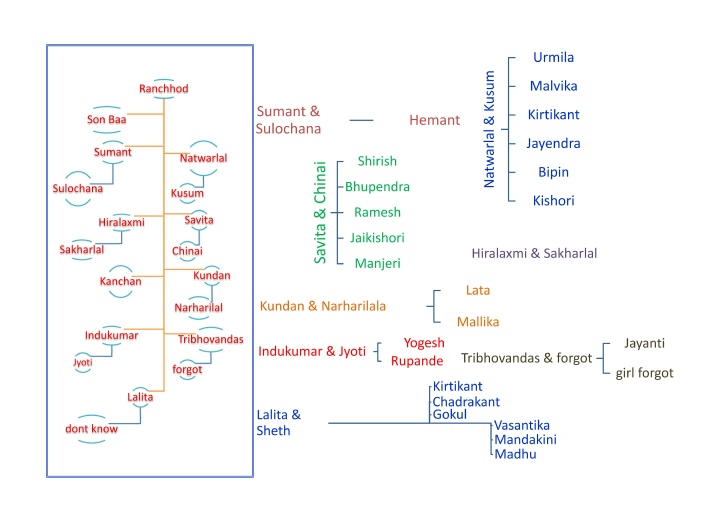
 પહેલું પાનું The Beginning
પહેલું પાનું The Beginning
 nd. No wonder papa’s second favourite poem was Wordsworth’s We Are Seven”. Papa as the “mama” had many nephews and nieces – Bhaani and Bhaniya -
nd. No wonder papa’s second favourite poem was Wordsworth’s We Are Seven”. Papa as the “mama” had many nephews and nieces – Bhaani and Bhaniya - independence, and was last known to be a journalist in that domain. Subsequently he tried his hand at various jobs. He lived with us for a few years when I was young, and he spoilt me silly. He was a bit of a handyman, repairing things, or making new boxes and stuff. Another colourful kaka was Indukaka. He was in the British-
independence, and was last known to be a journalist in that domain. Subsequently he tried his hand at various jobs. He lived with us for a few years when I was young, and he spoilt me silly. He was a bit of a handyman, repairing things, or making new boxes and stuff. Another colourful kaka was Indukaka. He was in the British- Indukaka had many adventures, and knew many “funny” characters. Cricket was his passion, which came true after he moved to Amdavad. And papa? This website is about him anyway, right?
Indukaka had many adventures, and knew many “funny” characters. Cricket was his passion, which came true after he moved to Amdavad. And papa? This website is about him anyway, right?



